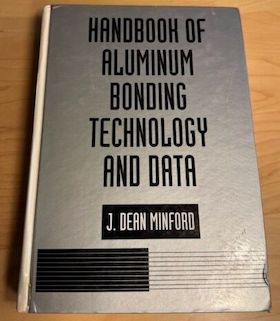
Sound technical content, curated with aloha by
Ted Mooney, P.E. RET
Pine Beach, NJ

The authoritative public forum
for Metal Finishing since 1989

-----
Aluminum/epoxy adhesion problems and delamination
We are currently dealing with a loss of interface adhesion between a highly filled epoxy (50% alumina) and an aluminum casting which has been machined, blasted and scrubbed clean with a pH 11 solution. The aluminum casting is then rinsed and baked before being placed in a closed mold. The mixed epoxy and filler are then added and cured at 80 °C. The application results in heating the epoxy coated aluminum casting. Delamination/failure of the coating/aluminum bond occurs during service. What are the preferred or required surface preparation steps that would be most appropriate for achieving the maximum adhesion performance? Any specific comments as to the chemical cleaning and degree of surface roughness on the performance of the adhesion joint would be appreciated. Thank you for your input.
Harry W [last name deleted for privacy by Editor]Failure Analysis Associates
1998
by J. D. Minford

on eBay or
AbeBooks
or Amazon
(affil links)
I am currently an engineering student at the University of Waterloo, in Waterloo Ontario Canada. I am a member of the Midnight Sun Solar Powered Car team, 7th place in Sunrace97. We are experiencing difficulty with our bonds between the aluminum frame and the kevlar and epoxy aerobody shell. We have tried various etching solutions and acids but have failed to come up with a really significant increase in the stability of the bond. If anyone has any information or ideas about products on the market or even different techniques of bonding aluminum and epoxy resin, there input would be very helpful.
Nick K [last name deleted for privacy by Editor]student (University of Waterloo)
1997
Please tell us what your present bonding cycle looks like. It is much more likely that someone who sees a process will make comments on how one might improve it, rather than having to launch out on their own (possibly) very tangent method.

Tom Pullizzi
Falls Township, Pennsylvania
1997
Phosphoric acid anodizing is often used where adhesive bonding is required. I believe that Boeing has a patented phosphoric acid anodizing process for adhesive bonding processes (BAC555) that they can tell you about. Good luck!

Ted Mooney, P.E.
Striving to live Aloha
finishing.com - Pine Beach, New Jersey
1996
Phosphating is another way to improve the adhesion of coatings on aluminum. Surface Technology Inc. (Henkel) has a patented formulation for the phosphating of aluminum which is now being used in the auto industry.
Ling Hao- Grand Rapids, Michigan
1997
Dear Sirs
Your paint adhesion problems refer to the what we call Black Smut Problem of the cast Aluminium . Cast Aluminium consists of a lot of foreign component and when we are doing any destructive operation on aluminium the Aluminium is dissolving but not the foreign components.
Henkel Surface Technology (previously called Amchem+Parker), Madison Heights Detroit Michigan, has a good solution to this problem. The process called Deoxalum 1000 process.
From my experience this process is solving your problems completely.
Sincerely Yours

Yehuda Blau
YB Plating Engineering and Quality - Haifa Israel
1999
Macdermid supplies a non-chrome treatment for aluminum specifically used for bonding epoxy adhesive ⇦ this on eBay or Amazon [affil links] s and paints to aluminum. Aerojet General uses this treatment to bond aluminum aircraft parts. The typical treatments, of course, include chromate conversion coatings and phosphates but it is also possible that zincate coatings could be of some value in this area.
Carl SteineckerWaterbury, Connecticut
1999
The problem with forming a bond between aluminium and epoxy is that as soon as aluminium is cut, cast, abraded or extruded, the surface forms an oxide which does not allow a bond. To avoid this, surfaces to be bonded should be scratched thoroughly with wet and dry sandpaper whilst wet with the epoxy glue ⇦ this on eBay or Amazon [affil links] or filler. The liquid shield prevents oxidisation until the epoxy has set, cementing a full bond.
Jay Macfarlanelaser cutting - Perth, Western Australia
2001
Another method used to combat this oxidation problem is to dissolve a small amount of epoxy resin in acetone ⇦ this on eBay or Amazon [affil links] Warning! highly Flammable! then, scour the aluminum with scotchbrite while keeping it immersed. Scouring removes the oxide and the trace epoxy prevents re-oxidation.
Pompae Armour- Sacramento, California
2002
Try using lemon juice, followed by a TSP solution...rinse well
Roger Blair- Newnan, Georgia
February 22, 2012
Q, A, or Comment on THIS thread -or- Start a NEW Thread